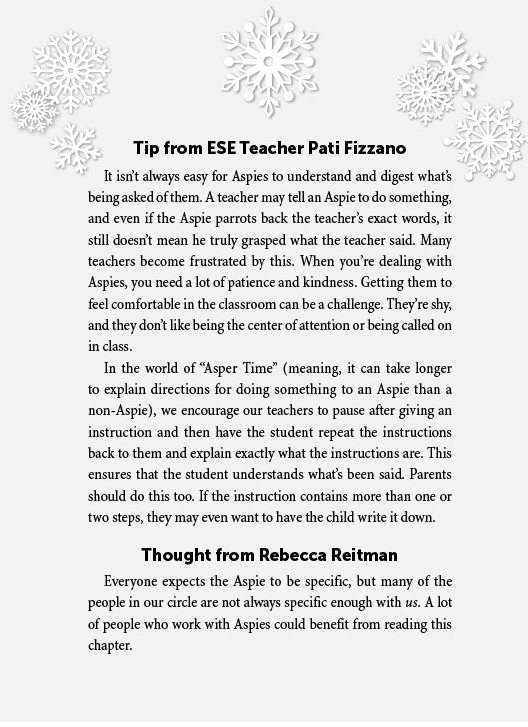
15 Specifics: Say What You Mean, Mean What You Say
Words are made for a certain
exactness of thought, as tears are made
for a certain exactness of pain.
—Rene D’aumal, French poet
Helpful Hint: When giving instructions to Aspies, be as specific as possible! Because of the way their brain works, Aspies don’t do well with processing vague instructions. So use precise numbers, exact times and dates, specific places, and names of persons.Leave no room for doubt in their minds.
Principle: As we’ve just seen in the previous chapter, Aspies’ brains are wired to literally interpret another person’s words. You can’t change their basic brain circuitry, but you can help them change how they perceive things. You can make it easier—both on you and for them—by keeping instructions or discourse simple, exact, and well-defined. I try to ingrain the mantra “Clarity, specificity, and accountability” in everyone I work with, but this phrase is particularly applicable to Aspies. There’s no place for abstractions or generalities. Be exact. Be specific.
Let’s look at an example of this principle. Your adult Aspie son, John, has a dentist’s appointment tomorrow. Since he lives in his own apartment, doesn’t drive, and the van for the disabled doesn’t go anywhere near his dentist’s office, you’ll be providing the transportation. As you start to make the arrangements for the trip, you want to make sure that there are no misunderstandings. So you phone (or e-mail or text) John and say, “John, I’m going to pick you up tomorrow morning around 10 to take you to your appointment. Please make sure you have everything you need.”
Guess what? You just messed up big-time. You took too much for granted. The Aspie brain has a hard time processing vague instructions like those. The anxiety begins to kick in immediately.

Imagine you’re an Aspie. Here’s what John thought when he got that message. “What appointment is he talking about? What does he mean by ‘everything I need’? What exact time is he coming? ‘Around 10’ could be anytime. My brain’s not fast enough to process all of this information. I’m not even sure where I’m going. What time will I be back? Do I need to pack my food? Bring a change of clothes? How can I know what ‘everything I need’ is if I don’t even know what time I’m coming back?
Here are the instructions you should have given to John, which would have been much easier for his brain to process: “Please meet me downstairs in front of your apartment building tomorrow morning at 10:15 so I can drive you to your scheduled appointment with the dentist. Make sure you have your ID card and your medical insurance card. When we are finished with the appointment, which should take approximately one hour, I will drive you back to your apartment.”
The upside to Aspies taking everything so literally is that specifics work really well with them. They prefer things in black-and-white, and they like explicit instructions and exact numbers. They don’t want to have to try to figure out anything. Their anxiety levels soar when you leave it up to them to figure out exactly what it is you’d like them to do, especially if you give them too much leeway and choice. So make it easy on the Aspie and yourself. Be specific.
ACTION PLAN: This one is straightforward. Just say what you mean and mean what you say. Be as specific as possible with numbers, times, dates, locations, colors—you name it. Don’t be vague. Be exact. Even as you try to educate Aspies on how the instructions they’ll hear in the real world might be open to misinterpretation, you should concentrate on being as clear as you can. Encourage them to ask for specifics if there’s the slightest doubt in their minds.


